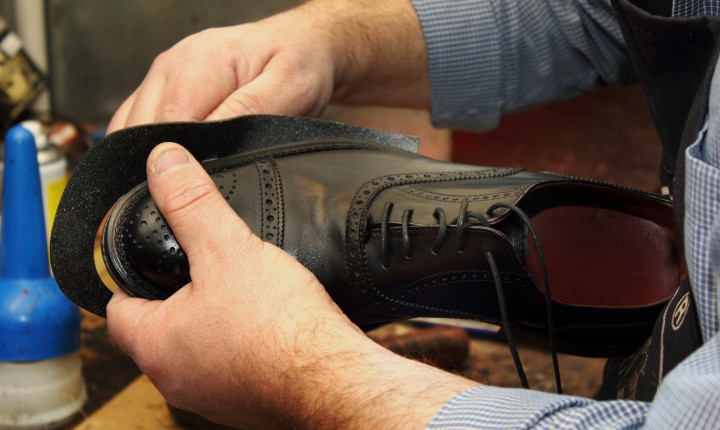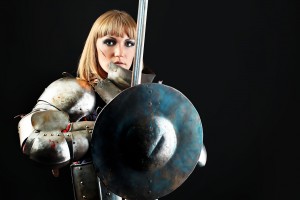Interview with Der Schumacher/Shoemaker Ingo Möller
During my stay in Germany I came across an amazing lost forgotten art: Shoemaking!
After breaking the handle of my purse, I walked into a store thinking it was a cobbler store and to my great surprise I realized that the tiny shop was the atelier of Mr. Ingo Möller, a shoemaker—an art on the verge of disappearance.

Until the 19th century, shoemaking was a traditional handicraft, but by the end of the century, the process had been almost completely mechanized, with production occurring in large factories.
The globalization has opened up a whole market of cheap labor forces and cheap mass production shoes, which resulted in the disappearance of traditional craftsmanship. Despite the obvious economic gains of mass production, the factory system produces shoes without the individual differentiation and quality craftsmanship that a traditional shoemaker is able to provide.…which resulted in the disappearance of traditional craftsmanship.
 While hand shoemakers still exist in England, Italy, Germany, and other places, their numbers are limited and clients few.
While hand shoemakers still exist in England, Italy, Germany, and other places, their numbers are limited and clients few.
In Germany, the central association for shoemakers in St. Augustin, near Cologne, lists 100 workshops in the country where custom-made shoes are produced. The knowledge and expertise of the skilled craft of shoemaking have been handed down from generation to generation. Bespoke luxury shoemaking is a domain of a very few—only a handful of artisans around the world have ever been capable of making traditionally Goodyear welted handmade shoes. I had the chance to meet and interview one of them, Ingo Möller, a German-based third generation bespoke shoemaker with more than two decades of experience, unmatched craft skills, and a unique eye for style and perfection. Here he shares his thoughts on the life as a shoemaker and talks about the importance of good shoes for a man.

Ingo Möller is a relic of a former time. In his small shop in Harrislee in northern Germany by the Danish border, Möller sews custom shoes almost entirely by hand.
MG – Tell our readers a little bit about yourself—how long have you been a shoemaker? And why did you choose this profession?
IM – My name is Ingo Möller, I am 53 years old and a third generation bespoke shoemaker master in Harrislee, Germany. I have been a shoemaker for 21 years and I chose this profession because shoemaking has been in my family for two generations. After finishing high school, I went to study engineering in Hamburg but it was really boring—too much theory and no hands-on practice. I decided to drop out and follow my family footsteps: I enrolled instead in shoemaker studies at the University of Hamburg to continue the family tradition and also to work with leather, for which I do have a real passion. Leather is simply the best raw material on the planet!
MG – What do you think about the men’s shoes sold in most stores nowadays?
IM – I believe that the shoes sold in most stores are overpriced. When you buy an average shoe in the store for 200 euros ($273) and get a glued, poorly made shoe, you are not getting the best value—the price/performance ratio is overvalued! Why would someone pay 200 euros for poor craftsmanship when a handmade shoe starting price is 199 euros? It simply does not make sense to spend that much money on mass-produced shoes!
MG – What should most men pay attention to when buying a pair of shoes?
IM – They should make sure that the upper of the shoes, as well as lining, sole, and back counter are made out of leather. The leather sole helps your feet breathe and the leather back counter gives the shoe extra durability. And for those who can afford it, calfskin leather is best compared to cow leather. It is the firmest and perfectly suited for shoes, as it adjusts to your feet’s shape right away and allows them to breathe.
MG – Where do you see yourself and the bespoke shoemaking 10 years from now?
IM – I can’t make predictions; only time will tell! But I hope that men or people in general will start developing a taste for high quality shoes. I have been selling high quality handmade shoes for the last ten years and the demand has been growing throughout the years—most people are not afraid to pay between 200 to 300 euros for a shoe that they know will last them from ten to twelve years; these types of shoes are repair-friendly. The sole of your custom-made shoes is what the tire is for your car. I can replace the sole on them up to nine times.
MG – Who is your clientele?
IM – Mainly businesspeople who need to look perfect in their work attire. I also have clients that come to my store wearing the perfect suit, driving the perfect car, and wearing second choice shoes. It simply does not match! This is, of course, the clientele that needs my help the most to perfect their gentlemanly image.
MG – That leads us to my next question: What kind of shoes should the perfect gentleman wear?
IM – As the saying goes, “No brown after 6 p.m.”; therefore, it is important to always own a classic pair of black shoes. Try the Budapester shoe: this classic shoe works perfectly with jeans or a dressy attire. It is a full brogue with sporty Derby-style open-throat lacing that lends it a refined yet casual look. “Budapesters” are double-stitched and fashioned on special round-toe lasts that give them their characteristic form with high walls upturned at the toe. There is also the regular Oxford* or the cap-toe. The plain Oxford basically is narrower and consists of the quarter and the vamp; it features neither a leather cap over the toe box nor does it have broguing. This style is simple yet elegant; black should be the number one choice for evening shoes. The cap-toe has, in addition to the vamp and quarters, an extra piece of leather. The so-called toecap is added across the toe box, and they also feature a heel cap. In black, the cap-toe Oxford is the classic business shoe worn by elegant men with their business suits across the globe.
Regardless of what classic shoes you choose, you should make sure that you do not wear the same pair of your custom made shoes every day, day in and day out. They are subjected to moisture and the leather needs time to dry. I highly recommend after wearing shoes one day, leaving them to rest for two days or at least 24 hours for accumulated moisture to evaporate. The best way to do it is to insert a cedar shoetree and lay the shoes on their sides—it allows the inlay to dry, and the cedar helps absorb the moisture and prevents odors from developing. Never, ever, keep your custom made shoes near a heater/radiator or in a humid basement.
* Little note for our American readers: The shoes described in the article are more familiar as Balmorals or “Bal-type” while to the English they are known as Oxfords. To the English, the Balmoral is an entirely different shoe (a particular type of Oxford with no seams, apart from the toe cap seam, descending to the welt). In this interview Ingo Möller uses Oxford the traditional, English way.
MG – What do you think about the shoes worn by men in the United States?
IM – I have never been to the U.S.; therefore, I can’t make any judgment about the shoes worn there. I can say that I am very impressed by the Allen Edmonds shoes—it is a high quality craftsmanship made in America.
MG – Can you recommend the Edmonds shoes?
IM – Yes, I can highly recommend the Edmonds Shoes; they are very well made.
MG – To conclude our interview, can you tell our readers a little bit about your shoes and your passion for shoes?
I compare my shoemaking to bespoke tailoring: It is an incredible feeling to have a suit made just for you.
IM – I compare my shoemaking to bespoke tailoring: It is an incredible feeling to have a suit made just for you. I had a suit tailor-made for me and it is an amazing feeling! Many people know about bespoke suits but very few come to the luxury of enjoying bespoke shoes. A bespoke shoe is specially made for you and will fit only you. There is a peculiarly pleasurable feeling of feeling your instep hugged all the way around the foot, which you only get with good bespoke. It is similar, in many ways, to the sensation of having a collar fit all around the neck on a first Bespoke suit. I still remember that feeling!
I would like to thank Ingo Möller for taking the time out of his busy schedule to answer my questions. Bespoke shoemaking is quite an interesting topic! For more information on Ingo Möller, e-mail him at ingo-moeller61@web.de, check his website at http://www.der-schuhmacher.de/www.der-schuhmacher.de/Schuhmacherei.html, or visit the store at Süderstraβe 75, 24955 Harrislee, Germany.
I hope Ingo’s advice will help you choose the right shoes in the future, and as always, if you need guidance, or if you are feeling adventurous with your wardrobe and want to step it up a bit, contact Leila@thenouveaustyle.com.
Related Posts
« Tonia’s Healthy Mediterranean Garbanzo Bean Salad 3 Proven Methods to Get More Out of Your Workout »





















